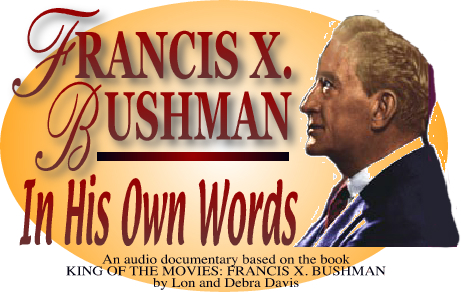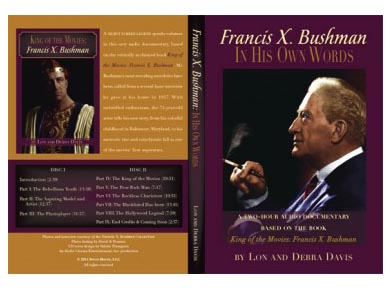

Lon and Debra Davis have provided one of the most enjoyable trips down the silent movie memory lane that has ever been produced. The audio reminisces of that greatest of early cinema matinee idols, Francis X. Bushman, are woven together in a very logical, chronological journey through the decades as we hear the great man talk about his childhood, his stage work, his entry into the movies, the stars and producers with whom he worked, his financial difficulties, his marriages, and more - all with a matter-of-fact attitude, spirited and proud. Segments are connected with excellent transitions and introductions by Lon Davis, complemented by the masterful piano melodies from the admired silent movie accompanist Ben Model (who has been playing piano and organ for silents at the Museum of Modern Art in New York for the past 28 years). The recordings are clean, clear and a very pleasant listening experience - and even at 74 years old, Bushman's voice is eloquent and strong - and the delight he takes in recalling his career is evident throughout over two hours of listening pleasure.
Bushman's life is a most interesting one, as a reading of the Davises' biography - KING OF THE MOVIES: FRANCIS X. BUSHMAN - will attest. Hearing the famed actor relate the tales that made his life such an intriguing one is simply good fun.
Bushman was neither shy nor modest. As a young child, he boasts, "Because I was so beautiful . . . everyone raved over me." He goes on to talk about being introduced to the differences between the sexes at an early age, how he smoked, fought regularly with other boys in the neighborhood and was a member of a gang. We hear him also remember how he developed the magnificent physique for which he was so popular during the 'teens.
His first marriage, the birth of five children, stage work,
and posing for illustrators are all recalled as events leading
up to his first job with a movie studio, Essanay, in 1911. It
was Essanay where he became a star and met Beverly Bayne - the
two becoming the most popular romantic couple on the screen during
the 'teens. Bushman proves his excellence as a storyteller as
he reminisces about the  noise and confusion
of as many as eight stages at work at the same time, how he requested
music to help him concentrate which he claims was then copied
by other performers, a situation in which he attempted to help
a fledgling comic named Charlie Chaplin with a problem at the
studio, and other recollections that give a "flavor"
of the time.
noise and confusion
of as many as eight stages at work at the same time, how he requested
music to help him concentrate which he claims was then copied
by other performers, a situation in which he attempted to help
a fledgling comic named Charlie Chaplin with a problem at the
studio, and other recollections that give a "flavor"
of the time.
Several of his stories are amusing, as was one regarding the cross-eyed comic Ben Turpin who was working as a stage hand at the time. Bushman said George K. Spoor (Spoor and Broncho Billy Anderson were the founders of Essanay) told how he watched Turpin take some expensive roses from the set. Spoor was angry that such thievery was taking place. He watched Turpin, though, as he went out the back lot, through a fence, and placed the flowers on a grave in the adjacent cemetery. Spoor was so touched, he told Turpin that anytime he wanted to take flowers from the studio and place on a grave in the cemetery, he should feel free to do so. Then Turpin responded, "Gee, boss, that's where I got them from."
Bushman talks about the astounding salary he was offered to move from Essanay to Metro and his request to have Bayne join him at the new studio. One of their most famous pairings was in "Romeo and Juliet." He tells how Fox "stole" the intertitles and locations to hurriedly get out their competing version, remembers going on a Liberty Bond Drive with Mary Pickford (he didn't like Pickford because of her sense of self-importance), his subsequent divorce so he could marry Bayne, and his long-time hobby of raising Great Danes.
Bushman's career began to wane with the twenties, however, one of the most engrossing portions of this amazing collection of memories is the actor's famous comeback as Messala in MGM's grand production of "Ben Hur" in 1926. However, his popularity was short lived. Bushman tells how he confronted Louis B. Mayer about $17,000 he was promised but never paid. The confrontation resulted in a tirade by Mayer and an invective that he would "blackball" Bushman in the industry - a threat that did bring Bushman's revival to an abrupt end.
One can't help but be amazed at Bushman's candor and frankness as he talks - without bitterness - of the loss of his fortune in the stock market crash. He does rebound in the 1930's and 1940's with thousands of radio broadcasts (his voice is excellent, as one can discern from this recording) and even a couple of movie appearances in the 1940's, and early 1950's, thanks to Darryl Zanuck.
As Davis tells us in one of the informative and delightful introductions, Bushman's third wife died in 1956, but he married a fourth time immediately afterward - and wife No. 4 was behind another resurgence of interest in the former star at the time of this interview in 1957.
Lon and Debra Davis are to be commended for bringing this
invaluable piece of cinematic history to us. It is well produced
and insightfully narrated - and Bushman is witty, charming, energetic
and engaging throughout. Forget the audio books - play this delightful
documentary . . . and sit back and enjoy!
Copyright 2012 by Tim Lussier. All rights reserved.